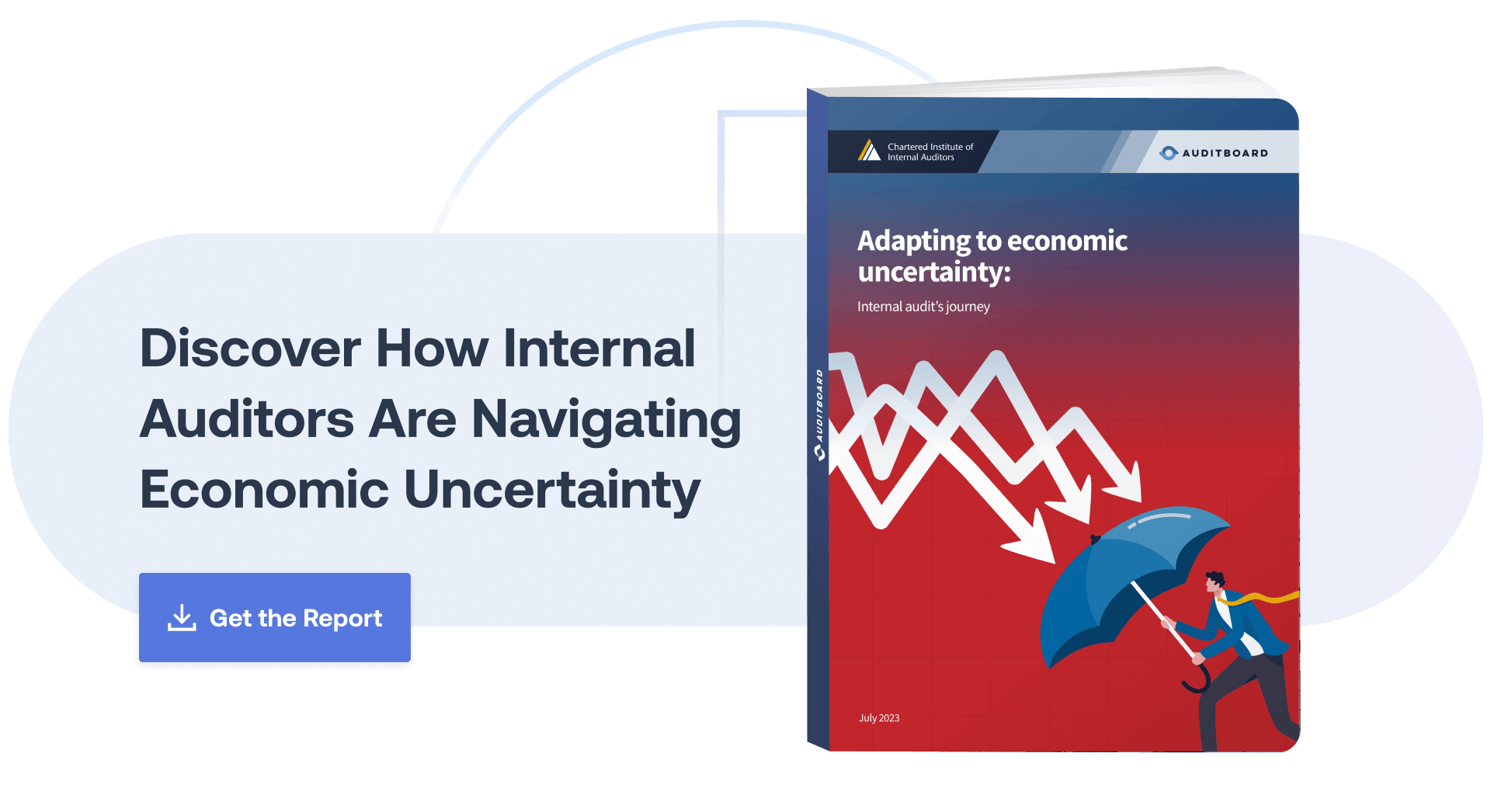
July 6, 2023 • 7 min read
7 Proactive Approaches Internal Audit Can Take to Adapt to Economic Uncertainty
Navigating economic uncertainty is a formidable challenge that demands resilience and adaptability from internal audit professionals of all industries. The collapse of Silicon Valley Bank in the United States followed by the emergency takeover of Credit Suisse by UBS in Europe earlier this year are reminders that economic disruption is not going away anytime soon.
In a new joint Chartered Institute of Internal Auditors and AuditBoard report, Adapting to Economic Uncertainty: Internal Audit’s Journey, we explore the valuable insights auditors have drawn from past economic shocks to transform their approach to safeguard organisations in an ever-changing landscape.
Download the full report, watch the video interview below with Richard Chambers (AuditBoard), Carolyn Clarke (Chartered IIA), and Siebrand Wolberink (Deliveroo), and continue reading to learn proactive approaches auditors can adopt to help their businesses thrive in times of uncertainty.
Resilience in Times of Crisis: How has the Past Shaped the Present?
Embracing concise one-page audit reports and memo audit communications has become crucial to effectively navigate this terrain, and these streamlined approaches must also be integrated into long-term audit plans. Additionally, it is paramount for internal auditors to grasp the organisation’s vital inputs and their vulnerability to economic volatility. By understanding these critical factors, auditors can better anticipate and address the potential risks posed by economic fluctuations, ensuring the organisation’s resilience and success in uncertain times. The following are some proactive approaches for auditors to consider adopting to bolster their organisations’ resilience against future economic shocks:
- Go digging: Identify the key risks the organisation may face in periods of economic volatility to expose the underbelly of weaknesses throughout the organisation. Ensure risk assessments for both the organisation and the internal audit team are up to date. If you feel a risk internal audit has flagged is not on the organisation’s radar, aim to tie it to its clear impact on the business. Often, the risks associated with economic volatility are complicated, so break them down and make them digestible.
- Evaluate the organisational culture: Do you understand the culture of your organisation? Does it align with your business’s strategic goals? You can’t all row in different directions in the same boat. The alignment of individual strategies and actions with the overall organisation’s values and goals is fundamental when building a resilient culture, or your organisation might end up capsising when the economic storm arrives.
- Get a pulse on key indicators: Internal audit functions need to keep a close eye on key indicators that can signal an approaching economic downturn. This includes monitoring rising prices of commodities, changes in funding levels, rises in fraud, customer defaults, staff turnover, sales, house prices, interest rates, and other factors that may signal a turn for the worse.
- Develop diverse skill sets: Internal audit professionals must invest in developing a diverse mix of skills and competencies. This includes enhancing communication skills, emotional intelligence, data analytics and business acumen. With a reduced pool of fresh internal audit talent available in the jobs market, hiring subject matter experts or people with skills that can translate to the internal audit profession may give you that unique voice in the room that proves to be a competitive edge.
- Build alliances: Internal auditors should cultivate strong relationships with key business functions such as finance, HR, risk management, and the CEO’s office. This collaboration enables a comprehensive understanding of organisational risks and effective communication of these concerns in times of economic uncertainty. Close collaboration with audit committees/boards and risk management on economic scenario planning prepares the organisation for future economic shocks.
- Get creative to be seen and be heard: All these proactive measures may be hard for some people in the organisation to understand as they may be more focused on growth rather than the danger ahead. So be creative with your messaging. Highlight what the risks associated with economic uncertainty can do to the bottom line — and senior management will pay attention.
- Stay fit: Is your organisation using tools such as economic scenario planning and simulation exercises? If yes, internal auditors should assess whether this is being done to the required level within the organisation. The value of scenario planning and simulations should be highlighted to management in a way that is meaningful and clearly links the potential impacts that economic shocks can have on the organisation. These exercises help identify vulnerabilities, assess viability, and provide valuable insights for not only internal audit but the organisation as a whole.
Adapting to economic uncertainty requires a comprehensive approach. By leveraging effective strategies and adopting proactive approaches such as these, internal audit functions can navigate economic uncertainty and position their organisations for success in an ever-changing landscape. To learn more, download the full report, Adapting to Economic Uncertainty: Internal Audit’s Journey.
You may also like to read


AuditBoard and IAF report: The more you know about AI-enabled fraud, the better equipped you are to fight it

Audit reporting best practices: Guide for audit leaders

Boards are struggling with AI oversight. How internal auditors can help

AuditBoard and IAF report: The more you know about AI-enabled fraud, the better equipped you are to fight it

Audit reporting best practices: Guide for audit leaders
Discover why industry leaders choose AuditBoard
SCHEDULE A DEMO




